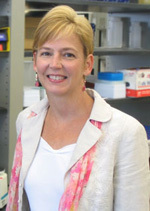Karin Remington, PhD, a leader in genomics research and the development of computational tools, begins her new position as director of the Center for Bioinformatics and Computational Biology (CBCB) at the National Institute of General Medical Sciences (NIGMS), a component of the National Institutes of Health (NIH).
Remington will oversee more than 1,300 research and training grants totaling about $89 million to support projects that join biology with computer sciences, engineering, mathematics, and physics. Research activities range from software development to modeling and simulation, computational genomics, database design, and high-throughput data. CBCB also oversees NIH's Biomedical Information Science and Technology Initiative and partners with the National Science Foundation (NSF) to support research and training in mathematical biology.
"To take advantage of all the data being generated by today's biological scientists, we need to develop the tools and methods that synthesize this information into new understanding of basic biology and, ultimately, human health," said NIGMS Director Jeremy M. Berg, Ph.D. "Karin Remington has the skills and vision to contribute greatly to these endeavors."




Ad Statistics
Times Displayed: 19090
Times Visited: 362 Stay up to date with the latest training to fix, troubleshoot, and maintain your critical care devices. GE HealthCare offers multiple training formats to empower teams and expand knowledge, saving you time and money
Before joining NIH, Remington served as the project manager for the National Ecological Observatory Network, or NEON, Inc., a $300 million effort supported by NSF to construct ecological data collection facilities across the contiguous United States, Hawaii, Alaska, and Puerto Rico. As vice president of bioinformatics research at The Venter Institute from 2002 to 2006, she led an NIH-supported large-scale genome sequencing production center and spearheaded a traveling laboratory-based educational program for public school students in Washington, D.C. At Celera Genomics from 1999 to 2002, Remington developed mathematical methods and computation leading to the completed sequences of the fruit fly, human, and mouse genomes.
"Computational biology faces the challenge of bringing together different disciplines in effective and energizing ways," said Remington. "With its cross-cutting nature, CBCB has the ability to coordinate and foster this interdisciplinary synergy."
Existing interdisciplinary programs under CBCB that Remington will oversee include the Models of Infectious Disease Agent Study, which builds computer models to improve the detection, control, and prevention of emerging infectious diseases; the National Centers for Systems Biology, which focus on the systems-level analysis of biological phenomena; and the National Centers for Biomedical Computing, an NIH Roadmap for Medical Research initiative to develop and implement a universal computing infrastructure for the biomedical research community.
Remington graduated magna cum laude in 1985 from the College of St. Benedict/St. John's University in her home state of Minnesota and in 1991 received a doctorate in mathematics from the University of Kentucky. She completed postdoctorate work at the University of Minnesota and Oak Ridge National Laboratory. She is a member of numerous professional societies, including the American Association for the Advancement of Science and the American Association of University Women.
NIGMS (http://www.nigms.nih.gov) supports basic biomedical research that is the foundation for advances in disease diagnosis, treatment, and prevention.
The National Institutes of Health (NIH) - The Nation's Medical Research Agency - includes 27 Institutes and Centers and is a component of the U.S. Department of Health and Human Services. It is the primary federal agency for conducting and supporting basic, clinical and translational medical research, and it investigates the causes, treatments, and cures for both common and rare diseases. For more information about NIH and its programs, visit www.nih.gov.

